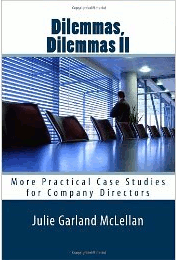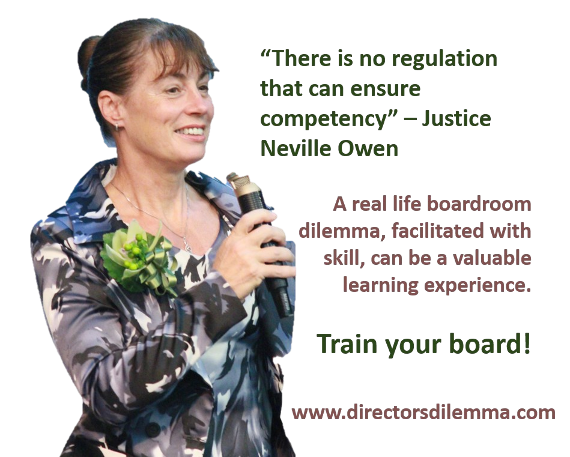Book review - Dilemmas Dilemmas II - More Practical Case Studies for Company Directors by Julie Garland Mclellan

If you are wondering what to get a director for Christmas this book will solve your problem!
Test your knowledge and practical skill against some of the best brains in boardrooms from all around the world with this collection of intriguing case studies based on real life events. Enjoy the suggested responses and develop your own. Use the case studies to train your board or mastermind group. Read it on the train, in the plane or while relaxing in your time off. Each short case study has enough issues to keep your mind engaged and your skills building for many months to come.
Available on Amazon.com or Amazon.com.au in hard copy or kindle edition.
Julie's news - In October
I was delighted to present a dilemma for the CPA Australia Directors Discussion Group. We looked at a succession planning family business situation that is relatively common and trickily difficult to resolve. As always it was a pleasure to discover just how creative accountants can be and how expertly the group was able to identify the key elements and develop strategies to resolve the issues.
Another highlight was the Clubs NSW Conference masterclass on Managing Conflicts of Interest in the Boardroom. We used real-life case studies to bring the concepts to life and both I and the participants had a wonderful time working out how to identify, record and manage the many conflict that arise in real boardrooms.
Then it was off to Melbourne with my NFP Director hat on to attend the Filex Immersive as a representative of the Fitness Australia Board. It is always great to see the value that professional peak bodies can add to their industries; this event was a great demonstration of the expertise and professionalism of the FA team and their colleagues from Filex. Thanks also to the Fitness Show for helping host the event.
Finally I had a trip to the Sultanate of Oman for another two day master class on boards and board secretariats that add value. It is many years since I was last in Muscat and the progress was immense. Progress in corporate governance has also been immense and the current code of corporate governance is a pragmatic and powerful principles-based code that will, if followed, lead to improved outcomes. It was great to have an opportunity to discuss the application of the Oman Code of Corporate Governance (which requires initial and ongoing training for directors of listed companies) and how to apply its provisions within an environment of global good board practice.
A trip to Canberra on board business and a few days of rest and recreation riding horses in Melbourne completed the month. Now I am looking forward to the work that November will bring.
I am always keen to work more and will be delighted to hear from you if you would like to arrange a board strategy workshop, education session, or board performance review.
Call me on the number below or reply to this email for a discussion of how I can help your board.
Inspirational quote for November - This month I decided to feature two quotes:

The second quote was just too topical to resist, given recent events at Tesla and the (selected years ago) focus of this month's case study:
"A chairman and CEO of a public company has important responsibilities to shareholders. Those responsibilities include the need to be scrupulous and careful about the truth and accuracy of statements made to the investing public, whether those statements are made in traditional forms such as a press release or an earnings call or through less formal methods such as Twitter or other social media." Stephanie Avakian, co-director of the SEC's division of enforcement.
A note on names - A note on names - A few readers have asked me where I find the names for the protagonists in each case study; I 'borrow' them from people I meet or things that I read. Finneas is derived from the Hebrew pinchas, meaning "the mouth of a snake" or "mouth of brass". It may also be derived from the Egyptian penechase meaning "dark". Our protagonist will have to balance the CEO's need for authenticity and self-expression with the prudent and strategic stewardship of his board and company.
This newsletter - If you have any ideas for improving the newsletter please let me know. If you are reading a forwarded copy please visit my website and sign up for your own subscription.
Suggestions for dilemmas - Thank you to all the readers who have suggested dilemmas. They are greatly appreciated. I will answer them all eventually. I could not write this newsletter without your help and without the generous help of all the experts who respond each month to the case studies.
Be a contributor - if you would like to attempt a response to the dilemmas for publication you will be most welcome. Simply reply to this email and let me know.
Let's connect - I use LinkedIn to share information about boards and directorship with my friends and acquaintances. If you use LinkedIn and we are not yet connected I will welcome a connection from you. You can find me at linkedin.com/in/juliegarlandmclellan.
Let me help you - If you would like me to speak to or train your board, staff, audience and/or group please contact me at julie@mclellan.com.au.
Farewell until the next issue (due 1 December 2018). I look forward to greeting you again then. In the interim I hope you will enjoy health, happiness and hard work.
Enjoy governing your corporations; we are privileged to do what we do!
Best regards,
Julie
 Finneas chairs a medium-sized listed company board. He has been with the company through a very successful CEO transition and is enjoying the challenge of helping the new CEO to hone his leadership of the company.
Finneas chairs a medium-sized listed company board. He has been with the company through a very successful CEO transition and is enjoying the challenge of helping the new CEO to hone his leadership of the company.
 The first step must be to formally advise the CEO not to make any further comments on matters referring to the business on any Social Media, including Facebook.
The first step must be to formally advise the CEO not to make any further comments on matters referring to the business on any Social Media, including Facebook.
 From my international experience in corporate and government sectors, recovering reputational loss is challenging with consequences reaching far beyond possible financial loss. Reputation needs to be proactively managed.
From my international experience in corporate and government sectors, recovering reputational loss is challenging with consequences reaching far beyond possible financial loss. Reputation needs to be proactively managed.


